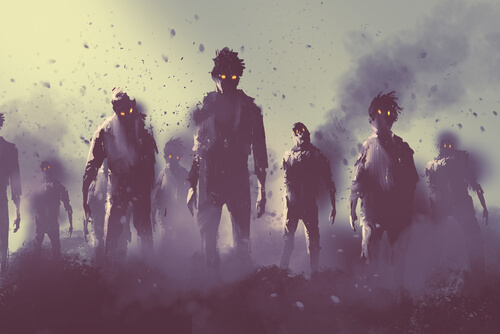Social Phobia: when Anxiety and Fear Control your Relationships


Written and verified by the psychologist Gema Sánchez Cuevas
Fear is a very powerful and sometimes necessary force. It’s the emotion that tells you when there’s something hostile around you so you can react. A zebra that isn’t afraid of the predator stalking it is a zebra without much chance of surviving.
But there are times when fear becomes an obstacle. This happens because the mechanisms it sets in motion are out of order. Anxiety is one of them. You get an intense feeling of fear and worry that are sparked by stimuli that aren’t actually threats. Phobias are good examples of this.
Spiders, snakes, small spaces, heights… There are endless stimuli people react to with irrational fear. Even relationships with other people can activate this kind of fear in some people. It’s called social phobia, and we’ll talk more about it here.
“The thing I fear most is fear.”
-Michael de Montaigne-
What is social phobia?
Social phobia, or social anxiety, is when people undergo intense symptoms of anxiety when they’re put in social situations. They have an irrational fear of being judged, humiliated, or mocked.
A person with social phobia can’t interact with others or easily carry out activities in a group. It doesn’t matter whether it’s at work, at a party, or playing sports. And taking action in front of other people makes them suffer. This can be just talking on the phone, asking for the check, or eating.
A person with social phobia has an intense fear of interacting with other people.

Although a lot of people think it’s a kind of shyness, the truth is that social phobia is it’s own thing. A shy person feels embarrassed and sometimes even scared, but in a very light way. In fact, a certain amount of shyness is normal for most people. But with someone who suffers from social phobia, the symptoms of anxiety and fear are way more intense and paralyzing.
What are the symptoms?
The physical symptoms experienced by someone with social phobia can include blushing, excessive sweating, dizziness, and shaking, or even as far as nausea, gastrointestinal problems, tachycardia, and anxiety attacks.
And these symptoms don’t just come up at the moment of social interaction. One of the characteristics of this disorder is overblown anticipation which makes these people live in a state of anxiety weeks before the event they have to confront.
The problem, just like with other phobias, is that often the anxiety pushes these people to avoid situations that make them feel scared. That’s how they get stuck in a vicious cycle where the main goal is to avoid interacting with others.
Social phobia makes the life of anyone who suffers from it much worse. It makes it harder to look for a job, friends, a partner, and other experiences. And by avoiding a situation that might unleash their anxiety, they reinforce their fear and make it stronger. The only way to overcome fear is to face it.
Can you get out of the vicious cycle of social phobia?
It’s possible to overcome social phobia, but just like with other anxiety problems, the path is long and takes dedication and strength. Recognizing and accepting the problem is the first step, but in most cases, it’s essential to seek out professional help to overcome this disorder.
Below are some of the key points that can help when it comes to confronting and managing social phobia.
Being aware of the problem
Knowing what’s going on with you is the first step before you can work on it. It’s also important for you to know that you’re not the problem, you just have a problem. We all have down moments and moments of victory, and strengths and weaknesses. We all have the right to be nervous and make mistakes. What’s important is being on the path to recovery.
Working on self-esteem and self-acceptance is essential when it comes to overcoming social phobia. That’s because it connects you with your essence so you can know yourself better. And that way it’ll be easier to accept what’s going on with you.

Facing fears bit by bit
Taking action is another essential step. The important thing when it comes to overcoming a phobia is to confront whatever makes you scared. But you have to do it bit by bit. You can start by practicing in safer environments like family gatherings, with a friend, or in small groups.
Another way to keep moving forward is to figure out your personal challenges. If you’re afraid of eating in public, try by packing your lunch until you’re eventually able to sit in the park and eat it.
If you’re afraid of participating in class, sign up for an activity where you know there will be less people and try to interact a bit. If what you’re afraid of is confronting other people’s opinions, you can start by debating something with a friendly family member.
The key is to start bit by bit and move on to the situations that give you the most anxiety. Keeping track of your steps forward is really good for motivation.

Learning to process the anxiety
Finding your own ways of processing the anxiety will be a big help. For example you can exercise, meditate, or learn relaxation techniques…The less anxiety you feel, the easier it will be to deal with it during your hardest moments.
“I must not fear. Fear is the mind-killer. Fear is the little-death that brings total obliteration. I will face my fear. I will permit it to pass over me and through me. And when it has gone past I will turn the inner eye to see its path. Where the fear has gone there will be nothing. Only I will remain.”
-Frank Herbert-
Seeking professional help
If you feel like you can’t move forward by yourself, or that you need some outside support, don’t hesitate to seek professional help. It’s been proven that cognitive-behavioral therapy, along with developing social skills and anxiety management tools, can also help with overcoming social phobia.
As you can see, social phobia is a restrictive problem that weakens relationships. But you can overcome it bit by bit if you make an effort. Above all: gather up the courage to give it a shot!
Fear is a very powerful and sometimes necessary force. It’s the emotion that tells you when there’s something hostile around you so you can react. A zebra that isn’t afraid of the predator stalking it is a zebra without much chance of surviving.
But there are times when fear becomes an obstacle. This happens because the mechanisms it sets in motion are out of order. Anxiety is one of them. You get an intense feeling of fear and worry that are sparked by stimuli that aren’t actually threats. Phobias are good examples of this.
Spiders, snakes, small spaces, heights… There are endless stimuli people react to with irrational fear. Even relationships with other people can activate this kind of fear in some people. It’s called social phobia, and we’ll talk more about it here.
“The thing I fear most is fear.”
-Michael de Montaigne-
What is social phobia?
Social phobia, or social anxiety, is when people undergo intense symptoms of anxiety when they’re put in social situations. They have an irrational fear of being judged, humiliated, or mocked.
A person with social phobia can’t interact with others or easily carry out activities in a group. It doesn’t matter whether it’s at work, at a party, or playing sports. And taking action in front of other people makes them suffer. This can be just talking on the phone, asking for the check, or eating.
A person with social phobia has an intense fear of interacting with other people.

Although a lot of people think it’s a kind of shyness, the truth is that social phobia is it’s own thing. A shy person feels embarrassed and sometimes even scared, but in a very light way. In fact, a certain amount of shyness is normal for most people. But with someone who suffers from social phobia, the symptoms of anxiety and fear are way more intense and paralyzing.
What are the symptoms?
The physical symptoms experienced by someone with social phobia can include blushing, excessive sweating, dizziness, and shaking, or even as far as nausea, gastrointestinal problems, tachycardia, and anxiety attacks.
And these symptoms don’t just come up at the moment of social interaction. One of the characteristics of this disorder is overblown anticipation which makes these people live in a state of anxiety weeks before the event they have to confront.
The problem, just like with other phobias, is that often the anxiety pushes these people to avoid situations that make them feel scared. That’s how they get stuck in a vicious cycle where the main goal is to avoid interacting with others.
Social phobia makes the life of anyone who suffers from it much worse. It makes it harder to look for a job, friends, a partner, and other experiences. And by avoiding a situation that might unleash their anxiety, they reinforce their fear and make it stronger. The only way to overcome fear is to face it.
Can you get out of the vicious cycle of social phobia?
It’s possible to overcome social phobia, but just like with other anxiety problems, the path is long and takes dedication and strength. Recognizing and accepting the problem is the first step, but in most cases, it’s essential to seek out professional help to overcome this disorder.
Below are some of the key points that can help when it comes to confronting and managing social phobia.
Being aware of the problem
Knowing what’s going on with you is the first step before you can work on it. It’s also important for you to know that you’re not the problem, you just have a problem. We all have down moments and moments of victory, and strengths and weaknesses. We all have the right to be nervous and make mistakes. What’s important is being on the path to recovery.
Working on self-esteem and self-acceptance is essential when it comes to overcoming social phobia. That’s because it connects you with your essence so you can know yourself better. And that way it’ll be easier to accept what’s going on with you.

Facing fears bit by bit
Taking action is another essential step. The important thing when it comes to overcoming a phobia is to confront whatever makes you scared. But you have to do it bit by bit. You can start by practicing in safer environments like family gatherings, with a friend, or in small groups.
Another way to keep moving forward is to figure out your personal challenges. If you’re afraid of eating in public, try by packing your lunch until you’re eventually able to sit in the park and eat it.
If you’re afraid of participating in class, sign up for an activity where you know there will be less people and try to interact a bit. If what you’re afraid of is confronting other people’s opinions, you can start by debating something with a friendly family member.
The key is to start bit by bit and move on to the situations that give you the most anxiety. Keeping track of your steps forward is really good for motivation.

Learning to process the anxiety
Finding your own ways of processing the anxiety will be a big help. For example you can exercise, meditate, or learn relaxation techniques…The less anxiety you feel, the easier it will be to deal with it during your hardest moments.
“I must not fear. Fear is the mind-killer. Fear is the little-death that brings total obliteration. I will face my fear. I will permit it to pass over me and through me. And when it has gone past I will turn the inner eye to see its path. Where the fear has gone there will be nothing. Only I will remain.”
-Frank Herbert-
Seeking professional help
If you feel like you can’t move forward by yourself, or that you need some outside support, don’t hesitate to seek professional help. It’s been proven that cognitive-behavioral therapy, along with developing social skills and anxiety management tools, can also help with overcoming social phobia.
As you can see, social phobia is a restrictive problem that weakens relationships. But you can overcome it bit by bit if you make an effort. Above all: gather up the courage to give it a shot!
This text is provided for informational purposes only and does not replace consultation with a professional. If in doubt, consult your specialist.







